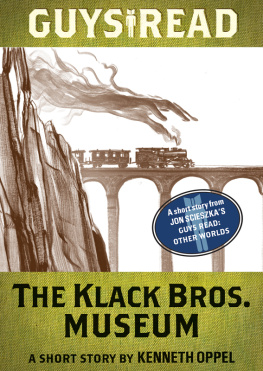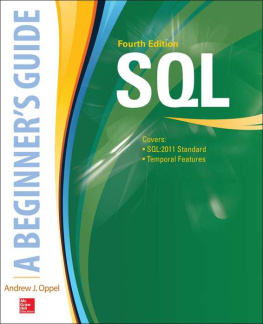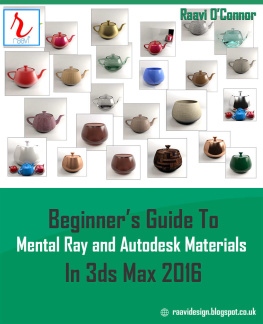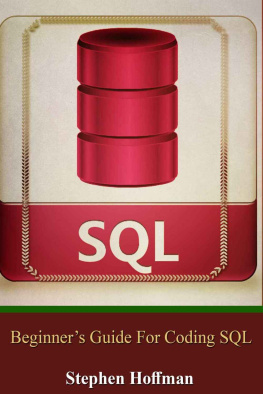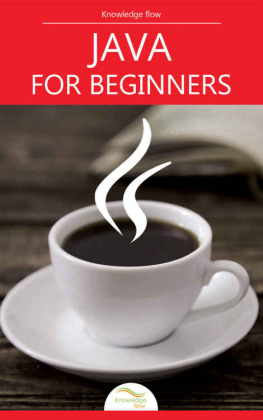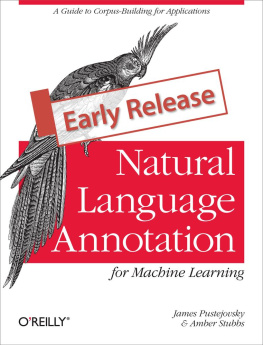Oppel - SQL: a Beginners Guide (eBook)
Here you can read online Oppel - SQL: a Beginners Guide (eBook) full text of the book (entire story) in english for free. Download pdf and epub, get meaning, cover and reviews about this ebook. City: San Francisco, year: 2015;2016, publisher: McGraw-Hill Education;McGraw-Hill Osborne, genre: Home and family. Description of the work, (preface) as well as reviews are available. Best literature library LitArk.com created for fans of good reading and offers a wide selection of genres:
Romance novel
Science fiction
Adventure
Detective
Science
History
Home and family
Prose
Art
Politics
Computer
Non-fiction
Religion
Business
Children
Humor
Choose a favorite category and find really read worthwhile books. Enjoy immersion in the world of imagination, feel the emotions of the characters or learn something new for yourself, make an fascinating discovery.

- Book:SQL: a Beginners Guide (eBook)
- Author:
- Publisher:McGraw-Hill Education;McGraw-Hill Osborne
- Genre:
- Year:2015;2016
- City:San Francisco
- Rating:5 / 5
- Favourites:Add to favourites
- Your mark:
- 100
- 1
- 2
- 3
- 4
- 5
SQL: a Beginners Guide (eBook): summary, description and annotation
We offer to read an annotation, description, summary or preface (depends on what the author of the book "SQL: a Beginners Guide (eBook)" wrote himself). If you haven't found the necessary information about the book — write in the comments, we will try to find it.
Oppel: author's other books
Who wrote SQL: a Beginners Guide (eBook)? Find out the surname, the name of the author of the book and a list of all author's works by series.
SQL: a Beginners Guide (eBook) — read online for free the complete book (whole text) full work
Below is the text of the book, divided by pages. System saving the place of the last page read, allows you to conveniently read the book "SQL: a Beginners Guide (eBook)" online for free, without having to search again every time where you left off. Put a bookmark, and you can go to the page where you finished reading at any time.
Font size:
Interval:
Bookmark:
Andrew (Andy) J. Oppel is a proud graduate of The Boys Latin School of Maryland and of Transylvania University (Lexington, KY) where he earned a BA in computer science in 1974. Since then he has been continuously employed in a wide variety of information technology positions, including programmer, programmer/analyst, systems architect, project manager, senior database administrator, database group manager, consultant, database designer, data modeler, technical trainer, and data architect. In addition, he has been a part-time instructor with the University of California (Berkeley) Extension for more than 30 years and received the Honored Instructor Award for the year 2000. His teaching work included developing three courses for UC Extension, Concepts of Database Management Systems, Introduction to Relational Database Management Systems, and Data Modeling and Database Design. He also earned his Oracle 9i Database Associate certification in 2003. He is currently employed as a technical program manager for GoodData Corporation. Aside from computer systems, Andy enjoys music (guitar and vocals) and amateur radio.
Andy has designed and implemented hundreds of databases for a wide range of applications, including medical research, banking, insurance, apparel manufacturing, telecommunications, wireless communications, human resources, and business intelligence. He is the author of Databases Demystified (McGraw-Hill Professional, 2010), SQL Demystified (McGraw-Hill Professional, 2005), and Data Modeling: A Beginners Guide (McGraw-Hill Professional, 2010), and coauthor of SQL: The Complete Reference, Third Edition (McGraw-Hill Professional, 2009). His database product experience includes IMS, DB2, Sybase, Microsoft SQL Server, Microsoft Access, MySQL, HP Vertica, and Oracle.
James Seymour is a graduate of the University of North Carolina at Chapel Hill with a BA in history and political science and the University of Kentucky with an MA in history. He first became involved with computer technology in 1965 with the mainframe environment at North Carolina. While in the United States Army during the Vietnam War, he was on the small team that worked with the mainframe setup at the Pentagon for various military strategic scenarios. Since 1972, he has been involved in many varied computer environments, including the second point-of-sale and inventory control project in the retail industry, analytical programs and database initiatives in the insurance and benefits industries, risk analysis and loss control start-ups, and many other application projects throughout many different industries.
From 1987 through 1995, Mr. Seymour was an instructor of database management in the community college system of the state of Kentucky. In this capacity, he created the first database management and C programming courses in the state of Kentucky and helped both public and private entities with urgent training needs, including the programming of guidance systems on cruise missiles for Desert Storm.
Before 1985 and through 1995, he was a system administrator, network administrator, programmer, and database administrator. Since 1985, Mr. Seymour has been a senior database administrator working primarily with DB2 and Oracle DBMSs on multiple platforms plus SQL Server beginning with version 7.0. In 2002, he became a senior data/database architect and one of the senior database administrators for a Fortune 100 company overseeing major projects in the United States, Canada, and the United Kingdom. While with this firm, he joined the author of this book, Andy Oppel, in writing many best practices and standards documents.
In 2010, Mr. Seymour began writing books on various topics in information technology and business. Currently, he has 26 small books on different topics for businesses, a large 460-page book on the enterprise in business and information technology, and a 280-page book on data archival and its importance. Additionally, Mr. Seymour has developed a ministry online to work with ministries around the world in various capacities; as of 2015, he works with nearly 3,800 ministries.

Copyright 2016 by McGraw-Hill Education (Publisher). All rights reserved. Except as permitted under the United States Copyright Act of 1976, no part of this publication may be reproduced or distributed in any form or by any means, or stored in a data base or retrieval system, without the prior written permission of the publisher.
ISBN: 978-0-07-184257-0
MHID: 0-07-184257-8
The material in this eBook also appears in the print version of this title: ISBN: 978-0-07-184259-4, MHID: 0-07-184259-4.
eBook conversion by codeMantra
Version 1.0
All trademarks are trademarks of their respective owners. Rather than put a trademark symbol after every occurrence of a trademarked name, we use names in an editorial fashion only, and to the benefit of the trademark owner, with no intention of infringement of the trademark. Where such designations appear in this book, they have been printed with initial caps.
McGraw-Hill Education eBooks are available at special quantity discounts to use as premiums and sales promotions or for use in corporate training programs. To contact a representative, please visit the Contact Us page at www.mhprofessional.com.
Information has been obtained by Publisher from sources believed to be reliable. However, because of the possibility of human or mechanical error by our sources, Publisher, or others, Publisher does not guarantee to the accuracy, adequacy, or completeness of any information included in this work and is not responsible for any errors or omissions or the results obtained from the use of such information.
TERMS OF USE
This is a copyrighted work and McGraw-Hill Education and its licensors reserve all rights in and to the work. Use of this work is subject to these terms. Except as permitted under the Copyright Act of 1976 and the right to store and retrieve one copy of the work, you may not decompile, disassemble, reverse engineer, reproduce, modify, create derivative works based upon, transmit, distribute, disseminate, sell, publish or sublicense the work or any part of it without McGraw-Hill Educations prior consent. You may use the work for your own noncommercial and personal use; any other use of the work is strictly prohibited. Your right to use the work may be terminated if you fail to comply with these terms.
THE WORK IS PROVIDED AS IS. McGRAW-HILL EDUCATION AND ITS LICENSORS MAKE NO GUARANTEES OR WARRANTIES AS TO THE ACCURACY, ADEQUACY OR COMPLETENESS OF OR RESULTS TO BE OBTAINED FROM USING THE WORK, INCLUDING ANY INFORMATION THAT CAN BE ACCESSED THROUGH THE WORK VIA HYPERLINK OR OTHERWISE, AND EXPRESSLY DISCLAIM ANY WARRANTY, EXPRESS OR IMPLIED, INCLUDING BUT NOT LIMITED TO IMPLIED WARRANTIES OF MERCHANTABILITY OR FITNESS FOR A PARTICULAR PURPOSE. McGraw-Hill Education and its licensors do not warrant or guarantee that the functions contained in the work will meet your requirements or that its operation will be uninterrupted or error free. Neither McGraw-Hill Education nor its licensors shall be liable to you or anyone else for any inaccuracy, error or omission, regardless of cause, in the work or for any damages resulting therefrom. McGraw-Hill Education has no responsibility for the content of any information accessed through the work. Under no circumstances shall McGraw-Hill Education and/or its licensors be liable for any indirect, incidental, special, punitive, consequential or similar damages that result from the use of or inability to use the work, even if any of them has been advised of the possibility of such damages. This limitation of liability shall apply to any claim or cause whatsoever whether such claim or cause arises in contract, tort or otherwise.
Font size:
Interval:
Bookmark:
Similar books «SQL: a Beginners Guide (eBook)»
Look at similar books to SQL: a Beginners Guide (eBook). We have selected literature similar in name and meaning in the hope of providing readers with more options to find new, interesting, not yet read works.
Discussion, reviews of the book SQL: a Beginners Guide (eBook) and just readers' own opinions. Leave your comments, write what you think about the work, its meaning or the main characters. Specify what exactly you liked and what you didn't like, and why you think so.

